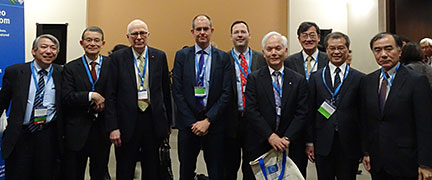Task team on Science, Technology and Innovation for SDGs
http://www.jst.go.jp/EN/about/sdgs/index.html
During the 2017 AAAS annual meeting in Boston, JST hosted the workshop on“How Can the Global Science Enterprise Effectively Respond to Sustainable Development Goals?”. This workshop aims to share recent achievements and potential solutions for SDGs, discuss how to realize opportunities for partnership beyond boundaries such as disciplines, organizations, and countries to work collaboratively on addressing SDGs. As an opening remark, Dr. Hamaguchi introduced the Japanís recovery from the Great East Japan Earthquake and shared how JST played a vital role to revitalize the local businesses through science, technology and innovation. Then, Mr. Otake talked about the purpose of the workshop as to enhance the science and policy interface for SDGs by networking the variety of stakeholders.
From JST, Mr. Kuramochi stated that SDGs could provide opportunities for the funding agencies, science communities and private sectors for creating shared values through STI. He shared two of JST’s funding programs to emphasize the importance of transdisciplinary research, the “backcasting” approach, new evaluation policy, collaboration for the mutual understanding and benefit, and development of human resources. Then, Mr. Dann du Toit mentioned that South Africa would act as a part of custodians in Africa for realizing SDGs. Indeed, the roles of STI are well aligned to the national development strategy. South Africa’s Department of Science takes the following five key principals into accounts for addressing SDGs, which are mainstreaming SDGs in national development strategy, avoiding duplication, developing large scale initiatives to pull together resources, investigating in people, and supporting science advice for policy making. From Germany, Dr. Max Voegler pointed out that DFG should not put priorities in science. Rather than having separate programs for addressing SDGs, DFG tries to build relationships for interdisciplinary and multi-stakeholder engagement to pull together people from different disciplines and sectors, and also to really pull science community into the SDG process for further understanding of SDGs.
After the reporting from three funding agencies, the moderator invited Dr. Teruo Kishi, S&T advisor to the Minister of Foreign Affairs, Dr. Hiraoaki Aihara from the University of Tokyo and Dr. Haruo Takeda from Hitachi to comment by public, academy and private sectors, respectively. Dr. Kishi introduced the Japan’s implementation policy for SDGs and role of Science advisor to the Minister and showed his expectation to the funding agencies and universities to play essential roles toward STI for SDGs. Dr. Aihara then announced that the University of Tokyo is in the process of creating a university-wide organization for better alignment of the university’s charter with the SDGs and would launch initiatives to promote a cross-disciplinary research concerning practical issues. From the private sector viewpoint, Dr. Takeda emphasized the importance of creating index that could relate to the two numbers, the profit of the current term and the stock prices, the private companies care for businesses. He also introduced new project launched at Japan Engineering Society and the SDGs-driven management at Hitachi.
Then, Mr. Kanehira from World Bank provided viewpoints from the international organization, especially how we could connect the existing activities to SDGs. He also shared the mapping activities done at the inter-agency task team (IATT) of the United Nations, which could provide overview of what each organization, each individual could contribute to the implementation of SDGs.
As Dr. Yuko Harayama, a member of Council for Science, Technology and Innovation, attended the workshop, the moderator asked her to give some comments. She stated that SDGs are goals we should move forward and every individual and organization including government should take collaborative actions beyond the own views.
From the floor, Dr. Takeo Arimoto from GRIPS asked the reporters how to integrate the new systems into the existing peer-review as insisting that funding agencies need new R&D funding systems and evaluation systems based on multi-disciplinary approach in order to achieve SDGs. Dr. Voegler emphasized that the science community and funding agency should create platform by realizing that only one discipline can no longer solve the societal issues. Mr. du Toit suggested sharing the various reflections at the international platform such as Global Research Councils, and Mr. Kuramochi also mentioned that funding agency and science community should co-design the activities for addressing SDGs.
At the end, as the co-chair of the 10-member experts of IATT, Dr. Colglazier shared the overview of the coming STI forum and expected the involvement of South Africa, Germany and Japan as chairing the forum in the future. He also mentioned that we should intend with the interests of private sectors which provide more money than government for achieving SDGs and raises the role of SDGs for peace building and inclusive institution.
We hope that this workshop could provide an opportunity to share the activities of funding agencies and viewpoints from public, academia and private sectors. JST would like to continue to facilitate such platforms in Japan and with international partners.

JST, an integrated organization of science and technology in Japan, establishes an infrastructure for the entire process from the creation of knowledge to the return to the society. For more information, visit http://www.jst.go.jp/EN/